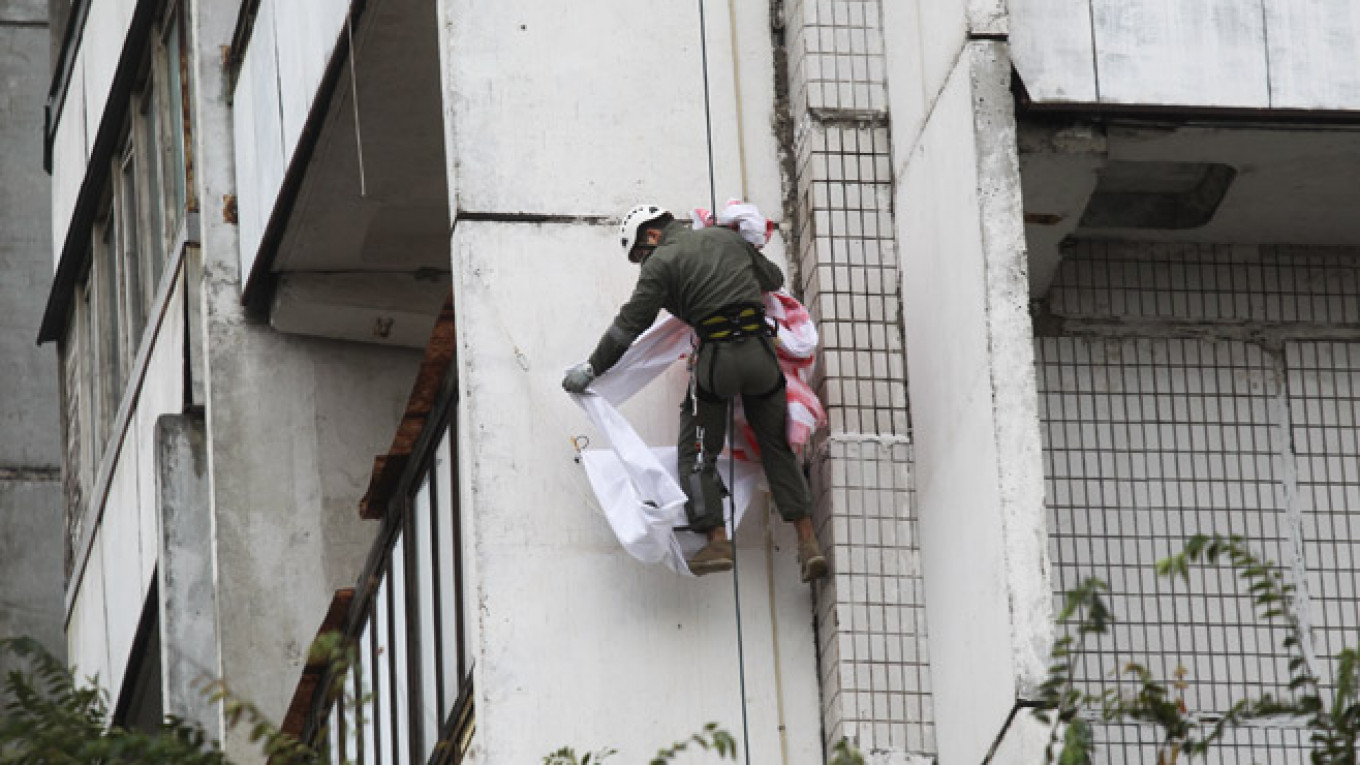Висеть: to be suspended, to hang
It's been a while since I've indulged in my obsession with stance verbs — verbs like стоять (to stand), лежать (to lie) and сидеть (to sit) that are used in what seem like whimsical ways to describe an immobile something or someone. There's yet another way to be immobile in Russian: висеть (to hang).
Unlike in English, lots of things hang or hang around in Russian. Anything suspended in the air is said to hang, especially things that provide light: Лампа висит над столом (A lamp hangs over the table). Луна висела над собором (The moon hung above the cathedral).
Things attached to walls also hang: Ещё Чехов писал, что если во время спектакля на стене висит ружьё, оно обязательно должно выстрелить (It was Chekhov who wrote that if a gun hangs on a wall during a play, then it absolutely must be fired). Над кроватью висел тяжёлый ковёр (A heavy rug was hanging on the wall above the bed).
Sometimes the hanging things stick out or hang over: На стене над ней висел металлический шкафчик (On the wall a metal cupboard loomed over her). Locks hang, too. На всех дверях висят замки (All the doors are padlocked).You also use висеть for things that hover in the air: Вертолёт висел над посадочной площадкой (The helicopter hovered over the landing pad).
Things hover figuratively, too, but for some reason, mostly bad things hang over people or in the air between them: В воздухе висело слово, которое все так боялись произнести (The word that everyone was so afraid to say out loud hung in the air). Напряжение висело между ними (There was tension between them). Над нами его решение висело как дамоклов меч (His decision hung over us like the sword of Damocles). На мне ещё долг висит (I've still got a debt hanging over me).
Threats hang: Угроза терроризма висит над всем регионом (The threat of terrorism hangs over the entire region). And sounds, too: Висели над улицей громкие крики (Loud screams could be heard over the street).
Clothes can hang in three different ways. They can hang on a hook or hanger: Платье висит в гардеробе (My dress is hanging in the closet). Part of them can hang down: Платье странно висит сзади (The dress sags strangely in back). And they can hang on a person, either because they are too big or simply unflattering: Она так резко похудела, что платье просто висит на ней (She lost so much weight that the dress just hangs on her). Платье висит на тебе как мешок — не идёт. (The dress just hangs on you like a sack — it doesn't suit you at all).
And things can hang in two ways around your neck. One is nice: На шее у неё висел амулет из бриллиантов и сапфиров (Around her neck she wore an amulet of diamonds and sapphires). The other is a burden: На шее у него висят студенческие долги (He's got student loans weighing him down).
In English, burdens are often on another part of the body: Куда мои родственники пойдут! Повиснут у меня на шее! (Where are my relatives going to go? I'll never get them off my back).
When you have burdens like this, you need to vent to a friend. That involves some hanging, too: Мы весь вечер висели на телефоне (We talked on the phone — literally "hung from the phone" — all evening).
Michele A. Berdy, a Moscow-based translator and interpreter, is author of "The Russian Word's Worth" (Glas), a collection of her columns.
A Message from The Moscow Times:
Dear readers,
We are facing unprecedented challenges. Russia's Prosecutor General's Office has designated The Moscow Times as an "undesirable" organization, criminalizing our work and putting our staff at risk of prosecution. This follows our earlier unjust labeling as a "foreign agent."
These actions are direct attempts to silence independent journalism in Russia. The authorities claim our work "discredits the decisions of the Russian leadership." We see things differently: we strive to provide accurate, unbiased reporting on Russia.
We, the journalists of The Moscow Times, refuse to be silenced. But to continue our work, we need your help.
Your support, no matter how small, makes a world of difference. If you can, please support us monthly starting from just $2. It's quick to set up, and every contribution makes a significant impact.
By supporting The Moscow Times, you're defending open, independent journalism in the face of repression. Thank you for standing with us.
Remind me later.








